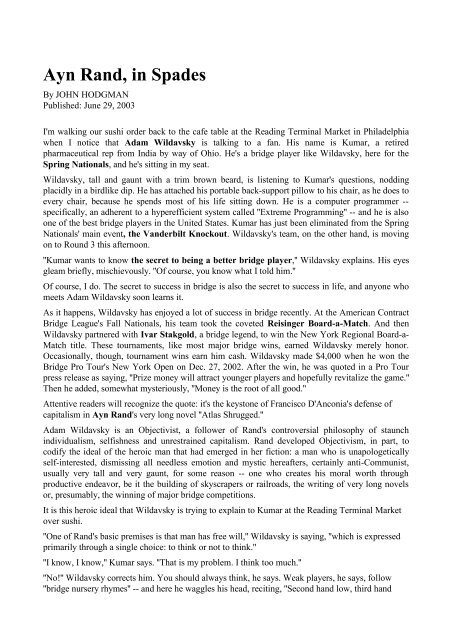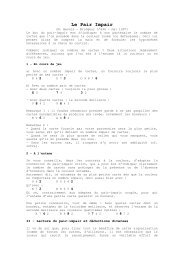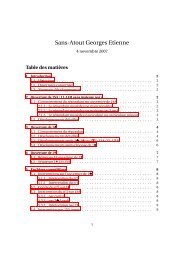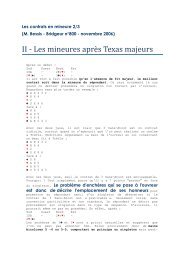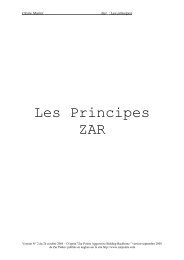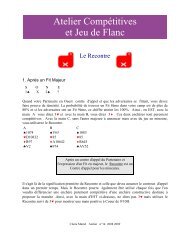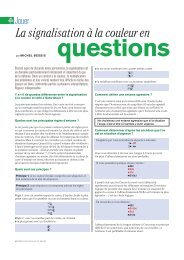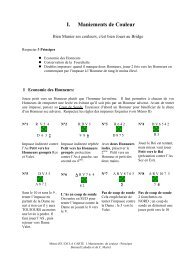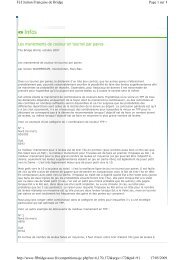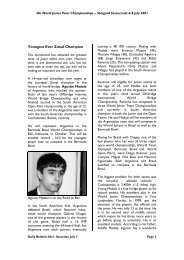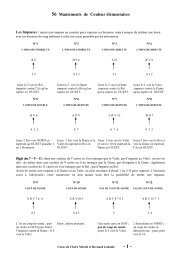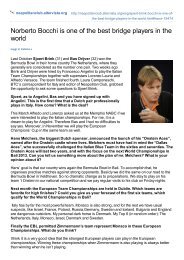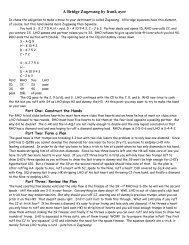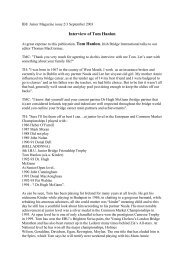Ayn Rand, in Spades - Claire Bridge
Ayn Rand, in Spades - Claire Bridge
Ayn Rand, in Spades - Claire Bridge
You also want an ePaper? Increase the reach of your titles
YUMPU automatically turns print PDFs into web optimized ePapers that Google loves.
<strong>Ayn</strong> <strong>Rand</strong>, <strong>in</strong> <strong>Spades</strong>By JOHN HODGMANPublished: June 29, 2003I'm walk<strong>in</strong>g our sushi order back to the cafe table at the Read<strong>in</strong>g Term<strong>in</strong>al Market <strong>in</strong> Philadelphiawhen I notice that Adam Wildavsky is talk<strong>in</strong>g to a fan. His name is Kumar, a retiredpharmaceutical rep from India by way of Ohio. He's a bridge player like Wildavsky, here for theSpr<strong>in</strong>g Nationals, and he's sitt<strong>in</strong>g <strong>in</strong> my seat.Wildavsky, tall and gaunt with a trim brown beard, is listen<strong>in</strong>g to Kumar's questions, nodd<strong>in</strong>gplacidly <strong>in</strong> a birdlike dip. He has attached his portable back-support pillow to his chair, as he does toevery chair, because he spends most of his life sitt<strong>in</strong>g down. He is a computer programmer --specifically, an adherent to a hyperefficient system called ''Extreme Programm<strong>in</strong>g'' -- and he is alsoone of the best bridge players <strong>in</strong> the United States. Kumar has just been elim<strong>in</strong>ated from the Spr<strong>in</strong>gNationals' ma<strong>in</strong> event, the Vanderbilt Knockout. Wildavsky's team, on the other hand, is mov<strong>in</strong>gon to Round 3 this afternoon.''Kumar wants to know the secret to be<strong>in</strong>g a better bridge player,'' Wildavsky expla<strong>in</strong>s. His eyesgleam briefly, mischievously. ''Of course, you know what I told him.''Of course, I do. The secret to success <strong>in</strong> bridge is also the secret to success <strong>in</strong> life, and anyone whomeets Adam Wildavsky soon learns it.As it happens, Wildavsky has enjoyed a lot of success <strong>in</strong> bridge recently. At the American Contract<strong>Bridge</strong> League's Fall Nationals, his team took the coveted Reis<strong>in</strong>ger Board-a-Match. And thenWildavsky partnered with Ivar Stakgold, a bridge legend, to w<strong>in</strong> the New York Regional Board-a-Match title. These tournaments, like most major bridge w<strong>in</strong>s, earned Wildavsky merely honor.Occasionally, though, tournament w<strong>in</strong>s earn him cash. Wildavsky made $4,000 when he won the<strong>Bridge</strong> Pro Tour's New York Open on Dec. 27, 2002. After the w<strong>in</strong>, he was quoted <strong>in</strong> a Pro Tourpress release as say<strong>in</strong>g, ''Prize money will attract younger players and hopefully revitalize the game.''Then he added, somewhat mysteriously, ''Money is the root of all good.''Attentive readers will recognize the quote: it's the keystone of Francisco D'Anconia's defense ofcapitalism <strong>in</strong> <strong>Ayn</strong> <strong>Rand</strong>'s very long novel ''Atlas Shrugged.''Adam Wildavsky is an Objectivist, a follower of <strong>Rand</strong>'s controversial philosophy of staunch<strong>in</strong>dividualism, selfishness and unrestra<strong>in</strong>ed capitalism. <strong>Rand</strong> developed Objectivism, <strong>in</strong> part, tocodify the ideal of the heroic man that had emerged <strong>in</strong> her fiction: a man who is unapologeticallyself-<strong>in</strong>terested, dismiss<strong>in</strong>g all needless emotion and mystic hereafters, certa<strong>in</strong>ly anti-Communist,usually very tall and very gaunt, for some reason -- one who creates his moral worth throughproductive endeavor, be it the build<strong>in</strong>g of skyscrapers or railroads, the writ<strong>in</strong>g of very long novelsor, presumably, the w<strong>in</strong>n<strong>in</strong>g of major bridge competitions.It is this heroic ideal that Wildavsky is try<strong>in</strong>g to expla<strong>in</strong> to Kumar at the Read<strong>in</strong>g Term<strong>in</strong>al Marketover sushi.''One of <strong>Rand</strong>'s basic premises is that man has free will,'' Wildavsky is say<strong>in</strong>g, ''which is expressedprimarily through a s<strong>in</strong>gle choice: to th<strong>in</strong>k or not to th<strong>in</strong>k.''''I know, I know,'' Kumar says. ''That is my problem. I th<strong>in</strong>k too much.''''No!'' Wildavsky corrects him. You should always th<strong>in</strong>k, he says. Weak players, he says, follow''bridge nursery rhymes'' -- and here he waggles his head, recit<strong>in</strong>g, ''Second hand low, third hand
community -- via the electronic newsletter of the bridge Web site, okbridge.com -- the letters swiftlyfollowed.''Have no doubt, whatever Adam Wildavsky may tell you, that the teach<strong>in</strong>gs of <strong>Ayn</strong> <strong>Rand</strong> areextremist,'' wrote a reader named Brian Meadows.''The 47 l<strong>in</strong>es about <strong>Ayn</strong> <strong>Rand</strong> should never have appeared,'' echoed Stefan (no last name given),with a bridge player's characteristic exactitude. ''I'm disgusted.''But the heroic man does not require acceptance. Consider ''Atlas Shrugged.'' After FranciscoD'Anconia delivers his ''Money is the root of all good'' speech to a party of government moochers,fey <strong>in</strong>tellectuals and moneyed socialists, he leaves them all to rejo<strong>in</strong> his fellow titans of <strong>in</strong>dustry andscience <strong>in</strong> a place called Galt's Gulch. The gulch is the Objectivist utopia, a refuge for the heroicth<strong>in</strong>kers whom the world has rejected. In many ways it resembles a bridge tournament: thick withC.E.O.'s (Warren Buffett is a renowned player of the game, and Bill Gates made an appearance atlast year's World Championships <strong>in</strong> Montreal) and as far away from the real world as it gets.On this day, utopia is the Philadelphia Downtown Marriott, site of the league's Spr<strong>in</strong>g Nationals --more than 100 events over 10 days, draw<strong>in</strong>g more than 5,000 players. They play <strong>in</strong> two four-hoursessions a day. The elite then head up to the suite of the league's president for cocktails and a deliplatter. Many more gather at the hotel bar for dr<strong>in</strong>ks and the constant reliv<strong>in</strong>g of hands.Adam Wildavsky strides <strong>in</strong>to this world on long legs, with a box of clement<strong>in</strong>es from the Read<strong>in</strong>gTerm<strong>in</strong>al Market that he drops off <strong>in</strong> his room before head<strong>in</strong>g down to the fifth floor, the bridgefloor. (Wildavsky is on the Zone diet. He wants to lose a few, he says, though he looks plentysk<strong>in</strong>ny to me. I guess we can all stand to be a bit gaunter.)Wildavsky is jo<strong>in</strong><strong>in</strong>g his six-man team for the afternoon's play of the Vanderbilt. It's the same teamthat won the Reis<strong>in</strong>ger, <strong>in</strong>clud<strong>in</strong>g Doub. Today, they're play<strong>in</strong>g aga<strong>in</strong>st a five-handed team that<strong>in</strong>cludes one of the best players from Argent<strong>in</strong>a and also one of the famous Hackett tw<strong>in</strong>s fromEngland, Just<strong>in</strong> or Jason, Wildavsky isn't sure which.One of <strong>Rand</strong>'s favorite adjectives is ''<strong>in</strong>different'': it describes a k<strong>in</strong>d of Objectivist Zen state ofselfish focus, and it describes Wildavsky perfectly. He seems beatifically clueless of the anxiety thatpermeates the hotel. He <strong>in</strong>troduces me to a man who is apparently one of the top players <strong>in</strong> theworld, a short man with angry eyes and gray hair. The man seems frustrated that I have not heard ofhim and shakes my hand reluctantly. His hand feels angry somehow, clawlike and clammy, and hism<strong>in</strong>d is clearly elsewhere: on the game to come or maybe some game from years ago. <strong>Bridge</strong>players are a haunted lot, possess<strong>in</strong>g long memories, particularly for the hands that went wrong.They have their own language, a sw<strong>in</strong>gy patois full of metaphors and eponyms that sounds like across between a science textbook and scat.(Consider this passage from Edgar Kaplan and Alfred She<strong>in</strong>wold's ''How to Play W<strong>in</strong>n<strong>in</strong>g <strong>Bridge</strong>'':''Five-card majors, pre-emptive jumps, weak two-bids, controlled psychics -- all have been widelyused by many others. We are advocates not of the separate <strong>in</strong>gredients but of the wholeconcoction.'')Wildavsky <strong>in</strong>troduces me to Ivar Stakgold, his friend and partner from the New York Regional.Ivar resembles a dist<strong>in</strong>guished foreign character actor, the k<strong>in</strong>d of guy who would be gett<strong>in</strong>g theMax von Sydow roles were he not busy be<strong>in</strong>g an applied mathematician and bridge legend. ''I knewEdgar Kaplan when I was a young man,'' he says. ''I contributed a little bit to the Kaplan-She<strong>in</strong>woldsystem. You know it? Yes. Anyway, <strong>in</strong> 1997, Edgar Kaplan passed away.'' He pauses, a littlesadly. ''There was a memorial service, and I said a few words, as people will do. And this youngman,'' he says, <strong>in</strong>dicat<strong>in</strong>g Wildavsky, ''approached me and said he was <strong>in</strong>terested <strong>in</strong> play<strong>in</strong>g theKaplan-She<strong>in</strong>wold system, which not many people were do<strong>in</strong>g. I had not played serious bridge for
years. It was a sad event, but someth<strong>in</strong>g good came out of it. He brought me back <strong>in</strong>to this terribleworld.''Later, I will ask Wildavsky about this story. Why did he <strong>in</strong>vite Stakgold to be his partner? Was itgratify<strong>in</strong>g to br<strong>in</strong>g someone of Stakgold's caliber back to bridge? In an e-mail message, Wildavskyscolds me for my sentimentalism. Kaplan-She<strong>in</strong>wold experts are hard to come by, he writes,especially ones that play well. ''Look for the selfish motive!'' he <strong>in</strong>structs.When Wildavsky gets his cards, he leans back aga<strong>in</strong>st his portable back pillow and tries to get hislegs under the stubby little table. There is a moment of study and rearrang<strong>in</strong>g of his hand. Then,with a decisive <strong>in</strong>ner nod, he sits up, gently arch<strong>in</strong>g his head and neck forward. Bidd<strong>in</strong>g beg<strong>in</strong>s, butit is silent -- each player <strong>in</strong>dicat<strong>in</strong>g his bid or his pass by pull<strong>in</strong>g the appropriate lam<strong>in</strong>ated card froma little box mounted to his right. Each player shows his bid card -- one spade, say, or two no-trumpor pass -- then places it face up on the table. There are perhaps two-dozen tables <strong>in</strong> this sectionedoffbit of ballroom, and for the course of the tournament, the room is full of the airy shuffl<strong>in</strong>g of bidcards, punctuated by the puff of an asthma <strong>in</strong>haler, a call for the card caddy or one partner quietlychastis<strong>in</strong>g another <strong>in</strong> between games. Wildavsky and Doub are play<strong>in</strong>g aga<strong>in</strong>st Michael Polowanand the Hackett tw<strong>in</strong> -- Jason, it turns out.All is go<strong>in</strong>g smoothly until Hackett pulls out the stop card, <strong>in</strong>dicat<strong>in</strong>g he is go<strong>in</strong>g to skip a level ofbidd<strong>in</strong>g. Wildavsky waits 10 seconds and then shows his pass card. He does this because he knowsthe rules, and the rules say he has to wait 10 seconds. But Hackett th<strong>in</strong>ks that Wildavsky waited toolong, and he raises his hand to call the director.<strong>Bridge</strong> is at once gentlemanly self-polic<strong>in</strong>g and deeply suspicious. You can't sigh funny or scratchyour nose or wait a second too long, or else you risk be<strong>in</strong>g accused of send<strong>in</strong>g ''unauthorized<strong>in</strong>formation'' to your partner. You must aspire to an even, expressionless tempo -- a k<strong>in</strong>d ofrobotism that, at later levels, is enhanced by screens that prevent partners from see<strong>in</strong>g one another,requir<strong>in</strong>g them to pass their bids through a small hole, like secret messages between prisoners <strong>in</strong>adjo<strong>in</strong><strong>in</strong>g cells.The director comes over. The players hunch and whisper their recollections of what happened, aquick Rashomon of silent seconds counted, who did what when. F<strong>in</strong>ally the director determ<strong>in</strong>es thedelay will not affect the outcome. Wildavsky and Doub end up w<strong>in</strong>n<strong>in</strong>g the session, help<strong>in</strong>g theirteam to a net ga<strong>in</strong> of 37 International Match Po<strong>in</strong>ts.Some people get angry when the director is called on them. But Wildavsky doesn't seem to m<strong>in</strong>d atall. That's exactly what should happen, he tells me later. It is when people are afraid to call thedirector that the system doesn't work.And Wildavsky likes systems -- especially, it seems, if they are somewhat antique, like Kaplan-She<strong>in</strong>wold, or a little counter<strong>in</strong>tuitive, like extreme programm<strong>in</strong>g, which boosts efficiency byhav<strong>in</strong>g two programmers work the same problem at once. (''That's someth<strong>in</strong>g of a tough sell tomanagement,'' he says.) And he seems to like systems that are clear and f<strong>in</strong>al, even if they areoccasionally opaque to the outsider, like bridge and like Objectivism.Objectivists believe <strong>in</strong> absolute laws, whether of nature or of morality. This is <strong>Ayn</strong> <strong>Rand</strong>'s promisethat ''A is A'': up is not down, good (capitalism) is not evil (Communism), unemployment <strong>in</strong>surancepromotes unemployment, three hearts cannot be bid after three spades and selfishness trumps all.Although sometimes it doesn't. Later that even<strong>in</strong>g, Wildavsky and Doub allow their opponents tomake a three no-trump contract, and at the end of the night, they are out of the runn<strong>in</strong>g. It's not easyto watch the team take <strong>in</strong> the surprise and sadness of this unexpected defeat. There is somesullenness, some verg<strong>in</strong>g-upon-tears. But Wildavsky bobs gently from toe to toe, a little shaken butgenerally calm.
''If I played perfectly every time,'' he says, ''what would be the po<strong>in</strong>t?''Wildavsky seems to have forgotten all about the loss when I meet him later at the hotel bar.''Objectivism is a reality-based philosophy,'' he will say later. ''We realize that time only moves <strong>in</strong>one direction. Whatever is <strong>in</strong> the past is not undoable.''We run <strong>in</strong>to Wildavsky's fellow bridge players Sheri W<strong>in</strong>estock and Uday Ivatury, who arehav<strong>in</strong>g cocktails and talk<strong>in</strong>g about Objectivism. W<strong>in</strong>estock is married to Fred Gitelman, anotherObjectivist bridge player, and together they write and distribute bridge educational software throughtheir bus<strong>in</strong>ess, <strong>Bridge</strong> Base.Ivatury, meanwhile, is a computer programmer who helped found the Pipel<strong>in</strong>e with James Gleick(also a bridge player) and is not any k<strong>in</strong>d of Objectivist. In fact, Ivatury openly, smil<strong>in</strong>gly, claimsthat he is try<strong>in</strong>g to deconvert W<strong>in</strong>estock away from right-w<strong>in</strong>g fanaticism. He has been needl<strong>in</strong>gGitelman and W<strong>in</strong>estock about <strong>Bridge</strong> Base: if they're such hard-l<strong>in</strong>e capitalists, why are theygiv<strong>in</strong>g this program away?''Uday doesn't understand that selfishness is not always about money,'' W<strong>in</strong>estock says. ''The game Ilove is dy<strong>in</strong>g. If I help br<strong>in</strong>g people <strong>in</strong>to the game, that is good for me.''Wildavsky nods. ''You can do th<strong>in</strong>gs for other people so long as it's not a sacrifice.''Some weeks later, I press Wildavsky on a similar po<strong>in</strong>t: if Objectivism truly gives him an edge <strong>in</strong>bridge, why share it with the competition? He gives me two answers, both of which I th<strong>in</strong>k are true.First: ''I just decided that my philosophy is the most important th<strong>in</strong>g that makes me what I am, and itcouldn't hurt to let people know.''The second explanation: it has to do with Sept. 11 and the sense that day provoked <strong>in</strong> Wildavskythat our society is under attack, not just from collectivism with<strong>in</strong> but also from a k<strong>in</strong>d of destructivenihilism without. ''It's more clear now that the survival of Western civilization is at stake,'' he says.A more Objectivist world would be a better place for Adam Wildavsky to live, and that wouldtrump whatever advantage he might lose <strong>in</strong> bridge.At the end of the night, back at the bar, Wildavsky runs <strong>in</strong>to Michael Polowan, Jason Hackett'spartner dur<strong>in</strong>g the controversy over the 10-second delay. ''I want to give you some advice,''Wildavsky says. ''There is a rule that I don't th<strong>in</strong>k Jason understands.'' Wildavsky goes on to expla<strong>in</strong>that under A.C.B.L. rules, he was correct to wait the full 10 seconds and posits that perhaps Jasonwas mistakenly follow<strong>in</strong>g the European rules on wait<strong>in</strong>g. Polowan rolls his eyes slightly, probablyth<strong>in</strong>k<strong>in</strong>g, sour grapes. But I don't th<strong>in</strong>k that's it at all. As a bridge player, as a programmer, as aphilosopher, Wildavsky is always f<strong>in</strong>e-tun<strong>in</strong>g the system. Why? Look for the selfish motive.


